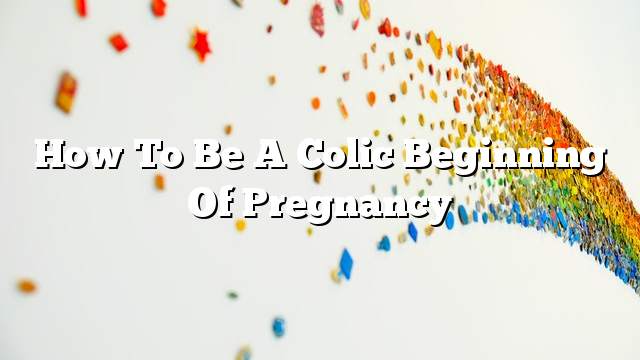Colic beginning of pregnancy
The occurrence of colic in the first months of pregnancy is normal, and affects many women in the early stages of pregnancy, for several reasons related to changes in the body as a result of pregnancy, and some types of colic are of psychological origin, and others caused by feeling cold, and may appear colic In the first month of pregnancy, similar to colic menstrual cycle, and may also think if the woman did not know prior to pregnancy, it is worth mentioning that there is no need to fear and see the doctor when feeling colic during pregnancy, but in rare cases and the colic associated with pregnancy is very severe, Problem, and requires communication with Doctor or visit the hospital soon.
Non-serious causes of colic during pregnancy
As mentioned previously, the colic associated with pregnancy is normal, and has many causes, including:
- Colic associated with the adhesion of fertilized egg in the wall of the uterus, and this colic usually after the first week of fertilization.
- Increasing the size of the uterus as the pregnancy progresses, and the pressure on the intestines, stomach and bladder may lead to a feeling of colic, where the pregnant woman feels permanent bloating and fastness, and to relieve it recommends eating smaller meals more frequently, instead of eating 3 fatty meals during the day, On the movement and exercise light, and go to the bathroom repeatedly and regularly.
- The prevalence of progesterone increases during pregnancy, leading to slow bowel movement in general, causing constipation and frequent gas, and therefore feeling colic. It is recommended to alleviate this condition to maintain the intake of ample amounts of water and fluids and the proliferation of foods containing fiber, Such as vegetables and fruits.
- Compression of the uterus and fetus on the abdominal ligaments As the pregnancy progresses, the feeling of colic and pain in the lower abdomen may be caused.
Serious causes of colic during pregnancy
In some cases, the feeling of colic during pregnancy is an indication of the existence of an intractable problem or complications of pregnancy that require recourse to the doctor.
- Ectopic pregnancy , Which means fertilizing the fertilized egg in an ectopic location and usually is implanted in the fallopian tube. This causes severe pain accompanied by bleeding between the sixth and tenth weeks of the beginning of pregnancy. The ectopic pregnancy is considered to be the case for direct treatment. Every 50 pregnancies, the chance of an ectopic pregnancy increases in the woman who has had the same problem in the past, or when performing surgery in the abdomen, pelvis, or fallopian tube, and also in the event of pregnancy with an intrauterine spiral, Pelvic area.
- Abortion , When pregnant suffer from colic during the first month of pregnancy, should be concerned about the possibility of abortion, especially since 15-20% of pregnancy ends with abortion, and indications of the occurrence of contractions and pain similar to menstrual pain, with vaginal bleeding.
- Premature birth , Feeling regular and regular contractions before the 37th week of pregnancy may be an indication of preterm delivery ahead of time, and here you should see your doctor immediately without waiting.
- Placental detachment The placenta is the organ responsible for providing the fetus with the oxygen and food necessary for its development. The placenta is associated with the upper wall of the uterus and is separated from the uterus only with the birth of the fetus. In rare cases, however, the placenta is separated from the uterus during pregnancy. The pregnant woman feels severe pain and increases with time at the bottom. Abdominal cavity, accompanied by a dark red blood discharge. In this case, a doctor should be consulted at the hospital, which will give birth to a cesarean section or stimulate normal labor.
- In other cases, the feeling of colic during pregnancy may be an indication Cases of pre – eclampsia , Or urinary tract infections, gallstones, or appendicitis.
Relieve colic during pregnancy
Taking a break in the feeling of colic or abdominal pain during pregnancy helps relieve it, as well as following the following tips:
- Take a sitting position for a while.
- Stretching on the opposite side of the side where you feel pain, with your feet up.
- Take a bath with warm water.
- Use “cold” in which warm water and put it on the place of pain.
- Try to relax.
Of preventive measures that reduce the incidence of colic during pregnancy, eat small meals repeatedly, and avoid fatty meals, and the increase of fluids and drinking water, and the proliferation of foods rich in fiber, and maintain exercise, and the discharge of the bladder regularly throughout the day, Enough sleep and rest every day.
Cases that require a doctor
Although the feeling of colic and abdominal pain during pregnancy, is normal and does not require concern, but you should see your doctor in cases where colic occurs and accompany any of the following:
- If the pain is severe or lasts for long periods, and does not go away with rest.
- Congestions occur more than four contractions at one hour for two hours.
- Feeling pain and burning when urinating, or the appearance of blood with the urine, it is indicative of the presence of infections in the urinary tract.
- The appearance of abnormal and abnormal vaginal discharge.
- Bleeding or appearance of blood spots.
- If the colic has heat or chills.
- Nausea or vomiting along with the feeling of colic.
- Disorders of vision or severe headache along with colic.
- Swelling and swelling of hands, legs and face.
